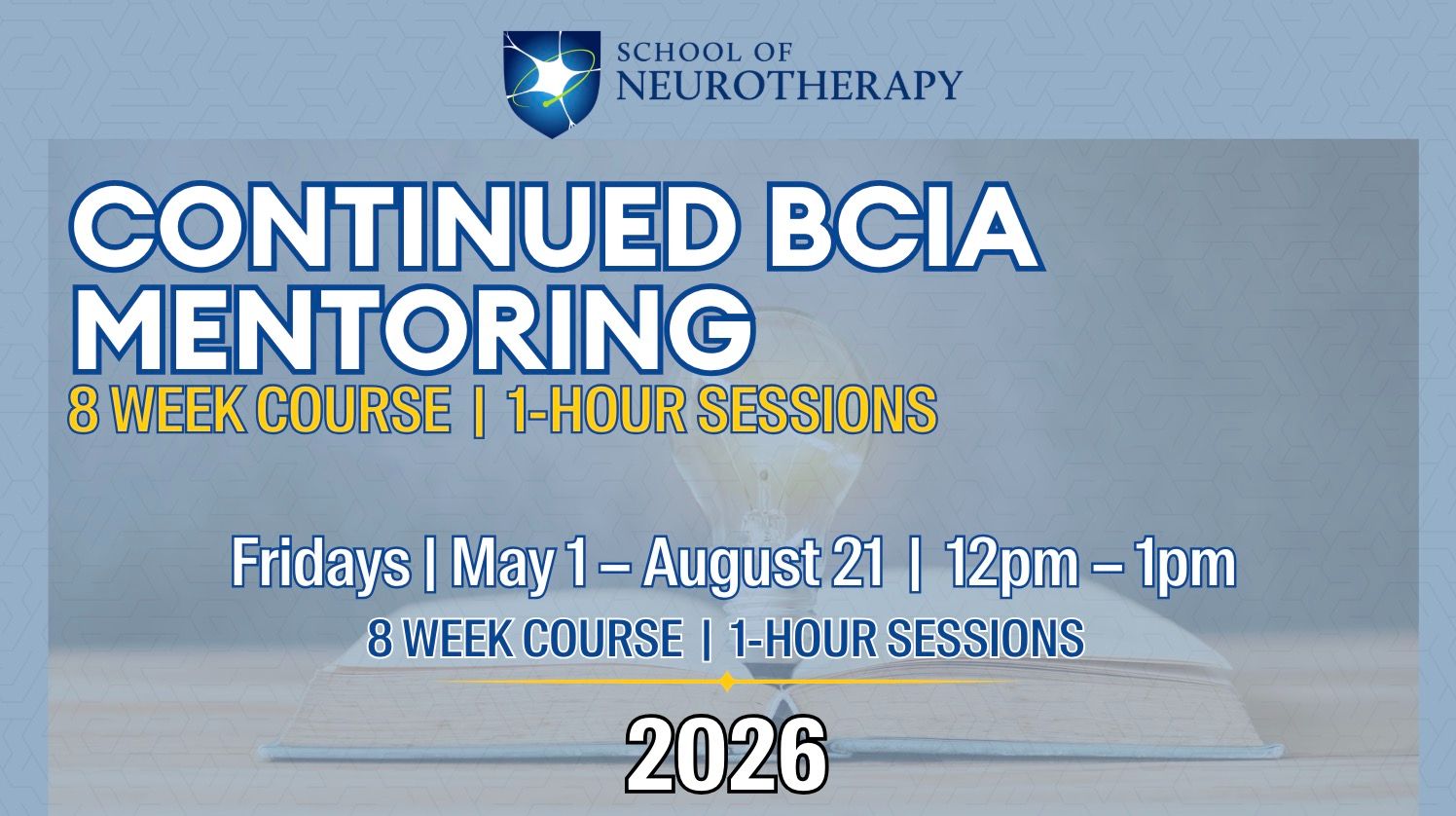
Education for the BCIA Certification
The BCIA Board Certification in Neurofeedback is a fundamental certification recognizing health care professionals who have demonstrated completion of specific education and training requirements in the field of Neurofeedback.

Course Requirements
You need not fulfill any basic requirements to take the 36-hour didactic course. This course is available to anyone who desires to know more about neurofeedback and neurotherapy.
To qualify for the BCN, you must demonstrate a Bachelor’s level degree in a health care related field. Approved health care fields include: psychotherapy, psychology, nursing, (including 2-year registered nurses with license; not including LVNs or LPNs), physical therapy, occupational therapy, rehabilitation, social work, counseling, chiropractic, exercise physiology, recreational therapy, speech pathology, physician’s assistant (proof of certification or license needed), and sports medicine.
The following fields require a master’s degree: music therapy and counseling education (M.Ed. in counseling). Appropriately credentialed doctors of medicine are also accepted. Degrees in health care fields other than those listed above must be submitted to the Certification Review Committee. BCIA will consider requests for special review for the demonstration of equivalency for most of our requirements, including prerequisite education. For answers to eligibility questions, please contact: [email protected].
Course Chapters and Content
Chapter 1: Orientation To NFB (4 Hours)
Chapter 2: Basic Neuroanatomy And Neurophysiology (4 Hours)
Chapter 3: Instrumentation And Electronics (4 Hours)
Chapter 4: Research Evidence Base For Neurofeedback (2 Hours)
Chapter 5: Psychopharmacological Considerations (2 Hours)
Chapter 6: Patient/Client Assessment & Intake (4 Hours)
Chapter 7: Developing Treatment Protocols (6 Hours)
Chapter 8: Treatment Implementation (6 Hours)
Chapter 9: Current Trends In NFB (2 Hours)
Chapter 10: Ethics And Professional Conduct (2 Hours)
Exam Requirement
Every candidate for the BCN or BCN-T must complete a 3-hour written examination, which covers the course material from the 36-hour didactic course. The exam is 100 multiple choice questions. You must get 65% or better to pass. The BCIA exam is typically offered at the ISNR annual conference (held annually in autumn at varying locations) or at the AAPB conference (held annually in the spring at varying locations).
Steps To Earning Your BCN Or BCN-T
The order of 3 through 5 need not be sequential.
- Submit an application to the BCIA here.
- Pay the registration fee. Fees vary depending on location. For more info, view the fee structure here
- Take a live or online Neuroanatomy, Neurophysiology, or Physiological Psychology course and provide a transcript or proof of successful completion.
- Take a 36-hour didactic training course.
- Find a BCN-Approved Mentor and complete/document the following sessions:
- 25 contact hours, 2 of which must be face-to-face. In these sessions, the mentor must document and sign off that the mentee has completed:
- Personal Neurofeedback Training Demonstrating Ability to Self Regulate – 10 sessions
- Clinical Neurofeedback Treatment with Clients/Patients – 100 sessions
- Neurofeedback Case Studies with mentor – 10 Presentations (BCIA will also allow for 1 contact hour and 2 case conference presentation hours if mentees attend BCIA Neurofeedback webinars)
- 25 contact hours, 2 of which must be face-to-face. In these sessions, the mentor must document and sign off that the mentee has completed:
- Register for and take the exam.
BCIA Neurofeedback Certification Programs

About BCIABoard certification is the mark of distinction for providers of biofeedback and neurofeedback services. Certification is valid for 4 years for providers who carry any BCIA credential. Recertification indicates continuous peer review of ethical practice and the acquisition of advanced knowledge of recent developments in the field through required continuing education. Names of certified practitioners may be found on the BCIA website in our Find a Practitioner search function. Board certification establishes that an individual has met entry-level requirements for the clinical practice of biofeedback. However, BCIA certification is not a substitute for a state-issued license or other credential to practice one's profession. Candidates for certification who do not hold a professional license, or its equivalent must stipulate that they practice under the legal supervision of a licensed provider when treating a medical or psychological disorder. |

Gain Further Advantages with Continued Mentoring with Steph Ryall
Continued Mentoring
BCIA Mentoring with Steph Ryall

